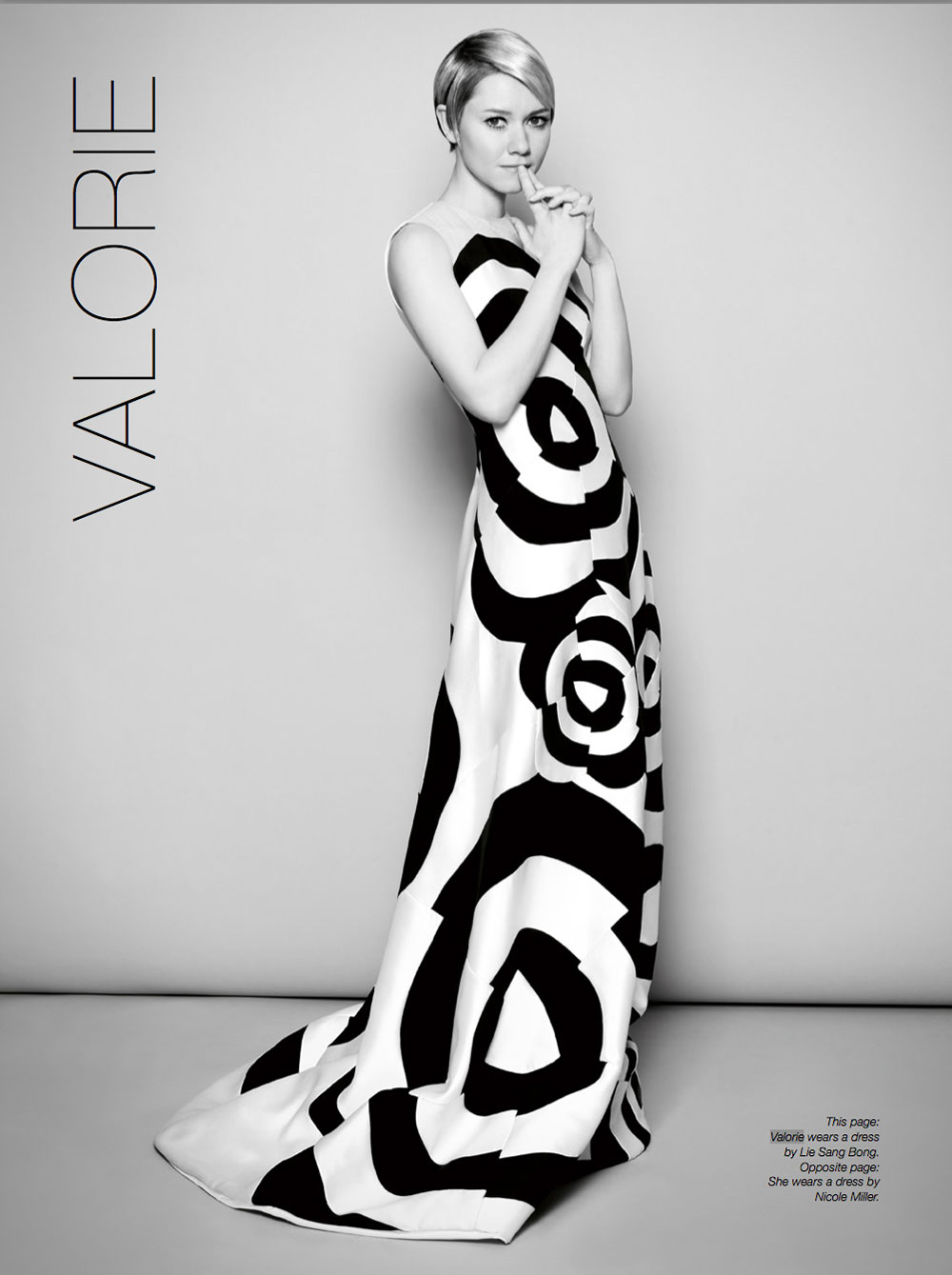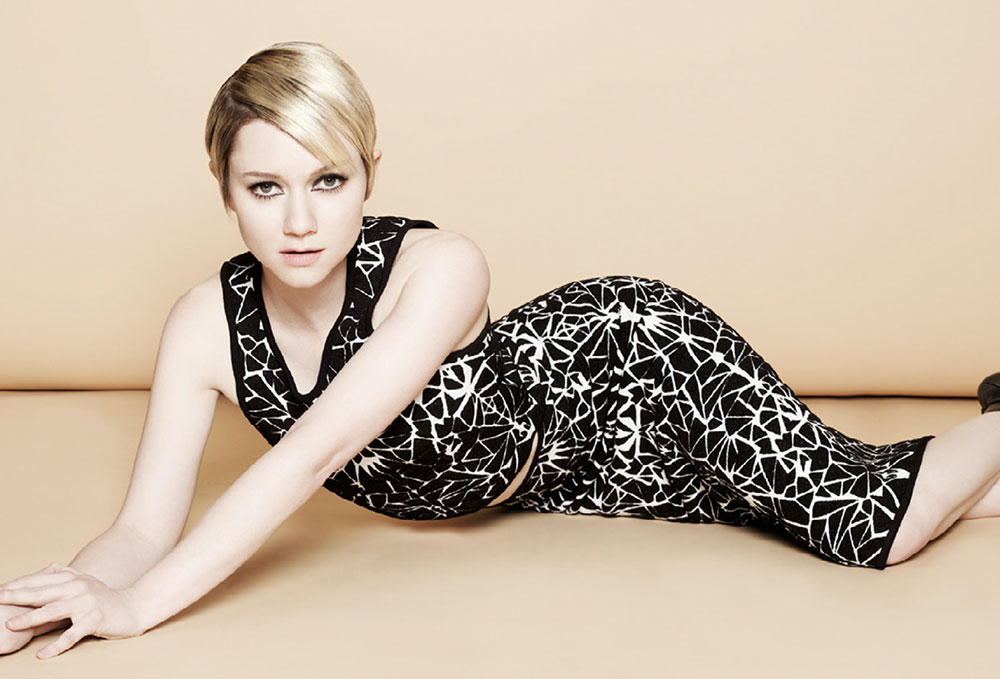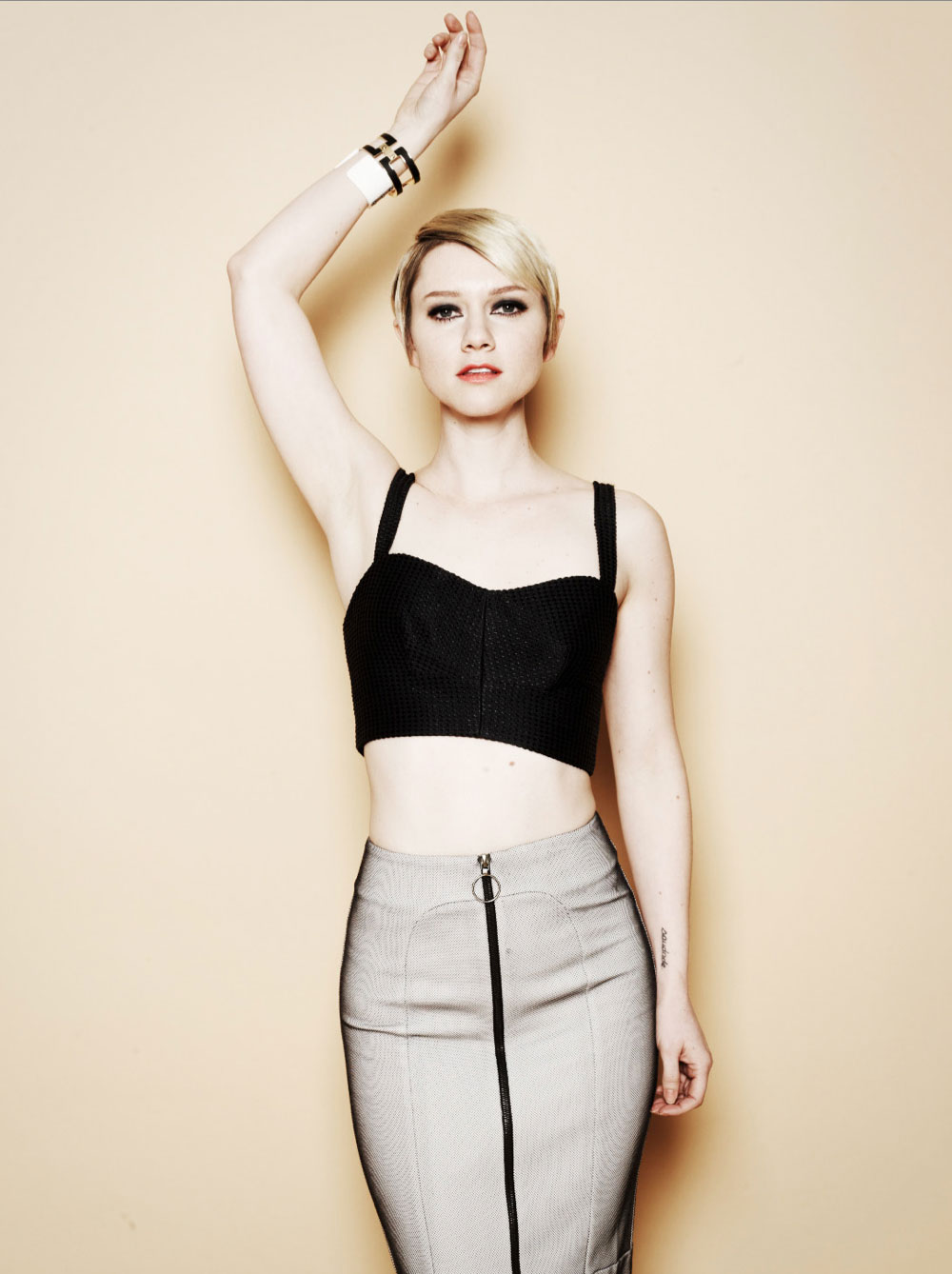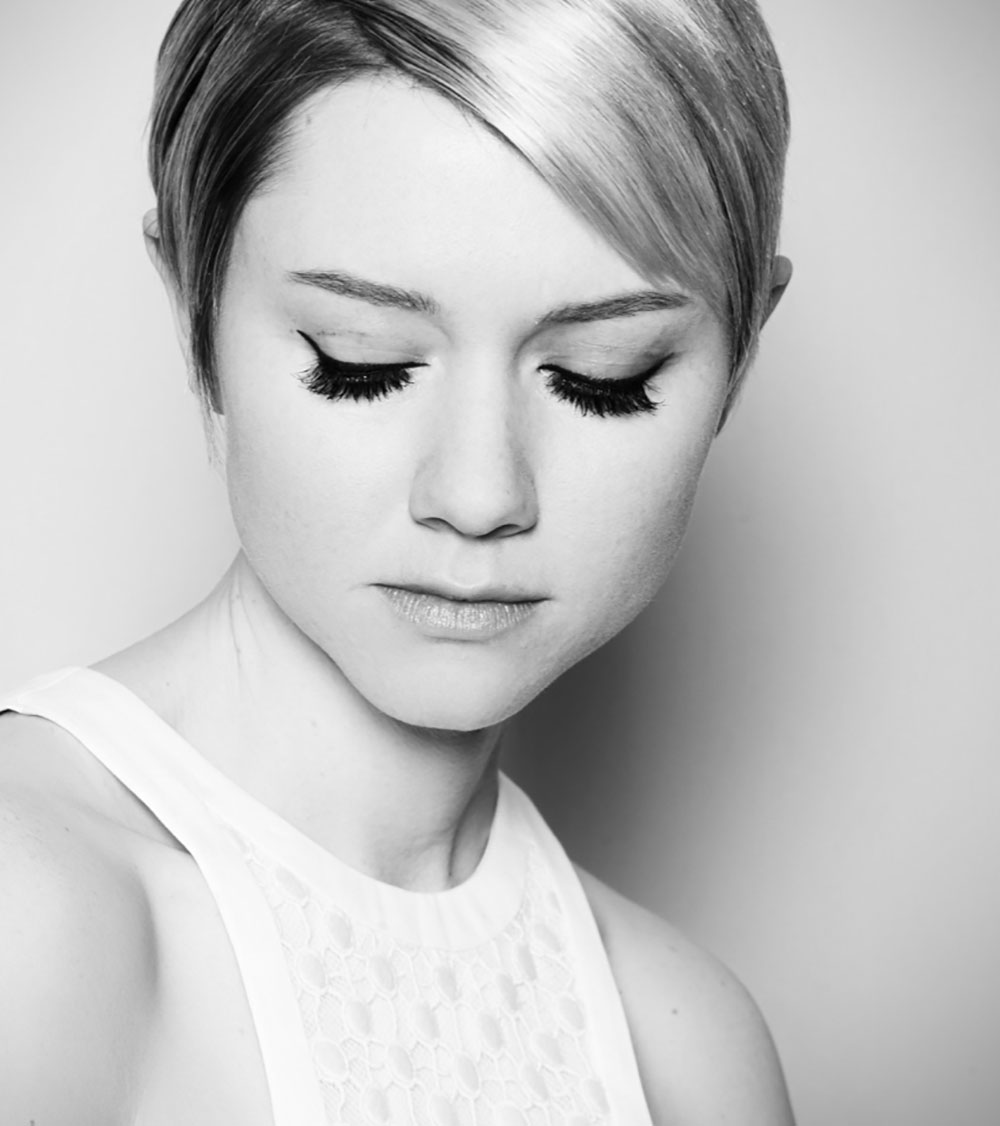
For up-and-comer Valorie Curry, a career in acting wasn’t exactly a choice; it was something closer to a calling. “It’s all I’ve ever wanted to do,” says the twenty-eight-year-old California native, whose passion for the form was influenced most readily by a childhood spent in creative and collaborate spaces. In fact, it’s her mother who has the distinct honor of serving as the catalyst for Curry’s passions. “She was actually a high school drama teacher and she was going to college,” Curry recalls, “and growing up, I was dragged along to rehearsals, so as soon as I could walk and talk at the same time, if they needed a kid, they would use me.” Once she learned about her great-grandmother’s passion for acting, Curry’s drive went into full swing. “She was from this small town in Idaho and she ended up going to Hollywood in the 1920s to be an actress, but there was a tuberculosis outbreak and she died at 26,” Curry says. “I always remember that, and I carry a picture of her on location with me and when I’m working.”
Curry broke into the industry at just nineteen years old, landing a recurring role on television’s cult classic Veronica Mars. “I was terrified almost every day,” Curry says. She took the job in the middle of a “rigorous acting program” at California State University, Fullerton, shuttling between the set and the classroom. Yet the challenge proved to be exactly what she needed. “It was a very good learning experience.” Curry looks back fondly on all of her learning experiences, both in and outside of the classroom, and credits them for cumulatively enriching the actor’s growing repertoire. “They’re tools that are incorporated into who you are as an actor and your entire perspective. The tools that are most useful are the tools you don’t have to think about.”

Curry has come a long way since then, having been featured in a number of high-profile projects including, most notably, the second chapter of the blockbuster Twilight franchise, New Moon. Curry is also featured in the Kevin Bacon television thriller The Following, where she plays the right-hand woman of the show’s nefarious cult leader. And while her television career is in full swing, Curry isn’t one to count out a potential return to theatre, which she considers worthy of equal passion and practice as her work on the screen. “Film and theater are a shared DNA,” she says. “The motivations and inner thoughts of the character might remain more mysterious to the audience. Television, on the other hand, has to be more accessible to people… It’s important to relate to characters on TV because they’re characters that are coming into people’s homes every week.” That intimacy makes for an added obligation in the acting process. “As an actor, you have to let the audience and the camera in a little bit more on the process of what’s happening with the character.”
For Curry, television is proving to be the medium pushing boundaries, most readily, creating a creatively exhilarating space for actors to play around in. “These are complex worlds with complex characters,” she says. “They are stories and shows that are challenging to the audiences. They’re not dumbing things down, and I get so excited to see audiences wanting that complexity, wanting that challenge.” According to Curry, this desire for more grounded and nuanced writing is what’s prompting a golden age in television. “I think that’s why the market is being flooded with wonderful material, and wonderful material for actors to work with.” She lives by an easy rule. “I remind myself to do what I love and follow my bliss, because I have to remember that time is limited.”
Curry recently got picked up for season 4 of the Showtime hit, House Of Lies, which airs on 1/11/15. In the meantime check out The Untitled Magazine‘s full interview with Valorie Curry and pick up a copy of The Untitled Magazine‘s “Legendary” Issue 7 or download the free “Legendary” Issue App on iTunes now!

Indira Cesarine: How long have you been performing?
Valorie Curry: I grew up acting; I grew up doing theater. My mom was actually a high-school drama teacher, and she was going to college at the time. Growing up, I was dragged along to rehearsals. So as soon as I could walk and talk at the same time, when they needed a kid, they would use me. It’s what I always wanted to do. Growing up outside of LA, my parents were very protective and wanted me to have a normal childhood, so they wanted me to wait until I was eighteen to pursue film and TV. I went to college for theater at Fullerton and while I was there, I got my first TV job on Veronica Mars. It was actually one of those actor dreams that I didn’t even know I’d hoped for. It was small, a five lines co-star, and they ended up liking me and they brought the character into a recurring excerpt. I had never been in front of a camera before. Pretty terrified every day and just trying to act and find my feelings and figure out what everyone did, because I was terrified almost every day. It was a very good learning experience doing that while I was in school. I’ve been really fortunate.
IC: What was your reaction when they told you that they were spinning the character into a larger role?
VC: I had no expectation of that, so obviously I was thrilled! And being nineteen years old in school, for me, it was the same as being thrilled about things like getting my car, and being able to pay for school. It was all those very preliminary steps for me. It was opening up doors. I didn’t really realize what kind of doors they were opening; I was still in school at that point.
IC: How much more schooling did you have in order to get your degree?
VC: I kind of took the scenic route, because I left and then went back to school. I was in a rigorous acting program, and after my third year, I was really burned out, and I wasn’t happy. I decided that I was going to take some time out of school and try to work more in LA. Within a month, came the 2000 strike. Everything came to a screeching halt. I went back to school, but I took a semester off during this intense accelerated time. Instead of going back to my acting program in my final year, I went back to study set design, which was a wonderful time for me. It was really a creative way that I hadn’t really experienced beforehand. I was moving creatively with no wrong answers and it was exactly what I needed. I finished school quickly, and then I moved to Los Angeles. It was a couple of years before I was acting again. I wasn’t sure if I was going to do it. I was out of school and I was burned for taking that time off, everything with the strike, but then [acting] is all I ever wanted to do. I needed to give myself a minute to consider what I wanted, and if something else would make me happy. So I did a lot of things, a lot of odd jobs. It was a weird time, and I didn’t really know the industry. I was just getting started, so I didn’t know what was normal at that point. There were a great couple of years in LA where I did a lot of different things. Odd jobs to get by, like being a nanny. Some of the other jobs were things I was passionate about; I worked as an organizer for Peace Action West, which was an anti-nuclear, anti-war organization. That was incredible, and I did that for a while. I worked in a restaurant, I did waiting. I did a lot. After a couple of years, I went back into acting just to get my tail in the water to see if I liked it anymore. I did a short film for a grad student at UCLA. A short film called I Love You Like Crazy. It was eight days. It was a big deal to take eight days from waiting tables. I did that and I loved it in a way I hadn’t known before.
IC: You also worked with Sex and the City, right?
VC: Yes, one of the teachers came to Fullerton and taught a Master’s class. I did a summer intensive with him in 2007. And I loved it. It was comedy writing and improvisation. It was kind of, in a way, doing set design. It was so freeing, after coming from such a rigid program, to be in an environment where there were no wrong answers, and to really find my voice as a person and a performer. It instilled a confidence that I hadn’t had at that point.
IC: Do you still draw on that kind of training when you’re on set?
VC: I think with any kind of training, at least for me, it’s not necessarily something you look back and have that same approach. They’re tools that are incorporated into who you are as an actor and your entire perspective. The tools that are most useful are the tools you don’t have to think about. But the basics of it are absolutely the basis of acting. Another thing I loved about the teacher from Sex and the City was that there wasn’t a pressure to be funny. It was about being honest and listening and reacting on the moment—those are good acting tools in general.
IC: Is there an actor or actress working now whose career that you are most taken by? Or whom you want to emulate the most?
VC: Absolutely. I have actors who are heroes for me. Whose work do I admire the most? Cate Blanchett, Miriam Margolyes. That’s kind of it for me. Particularly Miriam, both of them have the effortlessness and total commitment to their characters. And they are so natural. I love them. I also know that Cate Blanchett used to work in theater in Australia. And what she does, that’s fantastic. In terms of young actresses and actors, I admire Brit Marling. I think she’s an incredible performer coming from the world of finance. I think all the strength, confidence, and intellect she brings comes from that world and makes her singular as an actress.

IC: Would you say that sort of effortlessness is a key factor in making someone a legend or an iconic artist?
VC: I think people react differently to different actors. Not every actress has that effortlessness. Some just have a grandeur to them. That’s one of the things about Meryl Streep. It’s so different from that delicacy, and she’s obviously one of the greatest legends of actors working right now. I think that’s one of the brilliant things about acting. People can relate and empathize with other actors.
IC: How would you explain the difference between being on film, being on television, and being on stage, aside from the obvious differences from the space itself?
VC: Film and theater are a shared DNA. They are creative and challenging. TV is a different approach, and so different from anything that I’ve been trained to do. When you’re training [for film or theater], it’s about the art and knowing your objective and knowing what the character wants, and you can’t necessarily do that in TV. You can’t create a story for yourself, because the next week, the writers could change it all into something completely different. It’s more about the person than it is the story. At the same time, I think that it’s important to relate to characters on TV because they are characters that are coming into people’s homes every week, so as an actor, you have to let the audience and the camera in a little bit more on the process of what’s happening with the character.
IC: Do you think the rules for actors are changing in television?
VC: I think that the content on television has risen exponentially in the past few years. They talk about it being the golden age of TV. It’s such challenging material, the characters aren’t so easily accessible and they’re not falling into these categories of good and evil. The story that audiences are watching week after week—The Following, Breaking Bad, Boardwalk Empire—all of those have complex worlds with complex characters. They are stories and shows that are challenging to the audiences. They’re not dumbing things down, and I get so excited to see audiences wanting that complexity; wanting that challenge, and I think that’s why the market is being flooded with wonderful material. It really is wonderful material for actors to work with. The budgets are so big now.
IC: Is there a director with whom you want to collaborate most?
VC: People always ask that. I love Kelly Reichardt. I love Sarah Polley; they make such wonderful characters. I’m also a huge Guillermo del Toro fan. His work is all so great. What names am I not thinking of? Those are the people that I love. I also love independent films, which you can probably see from the names I’m saying. I think there is good content across the board.
IC: Did you have a mentor growing up, or is there one you have now?
VC: You know, it’s weird to say that there isn’t. I think it’s a conversation that I’ve had with a lot of actors. Frankly, a lot of young women who are actors are wanting to find someone to be that mentor. You hope for that, and I think that it sometimes takes a long time to find somebody to look up to. It’s one of the unfortunate side effects of being in an industry that is so competitive. Finding somebody who is not only relating to you as an actor, but with whom you also don’t have that sense of competition. I’ve been fortunate enough to work with incredible actors and directors in the past couple of years and I take every opportunity that I’ve spent with them as an opportunity to learn. But, no, I haven’t yet found that person to look up to. I’m open to it; I’m accepting applications!
IC: What is your favorite project that you’ve worked on so far?
VC: Favorite project so far? They’re so different that choosing would be impossible. Obviously, The Following is always going to have a precious place in my heart for how much it’s changed my life. Frankly, it was the first high-profile role that I’ve had. It’s been a once in a lifetime opportunity. I’ve worked with incredible people and I’ve learned so much. I also did an independent film, Out of Darkness, where I worked with Kyra Sedgwick, and it was completely different; twenty-five days in a house in Nashville making this already immersive film. It was very method and when you were on set, you were expected to be in character, because you never knew when they were going to just pick up a camera and start filming whatever it was that you were doing, and that’s an actor’s dream, it’s amazing. Sitting up at night and talking, it’s kind of like school again. I’ve had some amazing opportunities. A group of friends and I started a company in Los Angeles that’s now going into it’s fifth season and I haven’t been able to do as many projects as I’d like because I’ve been busy working. It’s impossible for me to choose my favorite project at this point.
IC: Are there any words of wisdom that you live by?
VC: I mean, there are a lot of different ways of describing what I hold myself to and what I try to remind myself to do, and I can put this in terms of a story that I always remember. My great grandmother wanted to be an actress in the 1920s. She was from this small town in Idaho. She ended up going to Hollywood to be an actress, and she died young. There was a tuberculosis outbreak and she died at twenty-six. I always remember that, and I carry a picture of her on locations when I’m working. I remind myself to do what I love and follow my bliss, because I have to remember that time is limited. That’s what I live by.
Interview by Indira Cesarine
Photography by Jonathan Bookallil
Fashion Editor: Indira Cesarine
Fashion Assistant: Chris Kim
Hair by Katsumi Matsuo
Make-up by Cheyenne @ Artmix Beauty
This article originally appeared in The Legendary Issue of The Untitled Magazine (2014).


